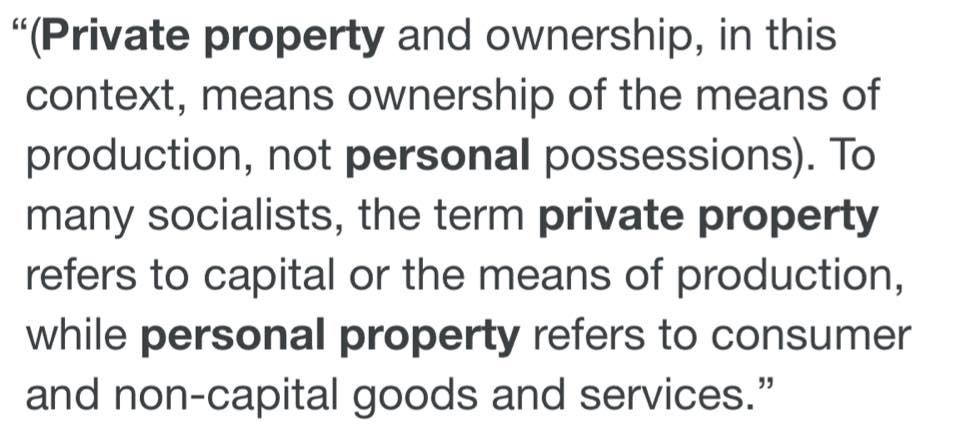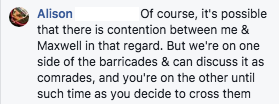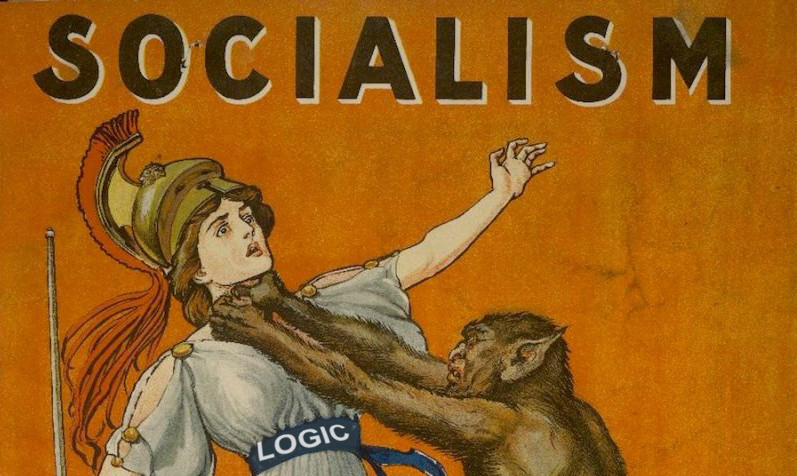In the recent “discussion” on our Facebook page about the Ramen Rich Girl, we posted a clever meme that we thought was pretty funny:

All the lefties and socialists on the thread thought it was hilarious too but for a different reason. They thought it was sooooooo funny that someone didn’t understand the difference between private property and personal property: “HAHAHAAH THIS RETARD DOESN’T EVEN KNOW THE DIFFERENCE BETWEEN PRIVATE AND PERSONAL PROPERTY!CLUTCH YOUR TOOTHBRUSH TIGHT, WE ARE LEGION AND WE ARE COMING FOR IT!” “Your failure to understand the distinction between private and personal property is not an argument” “Somebody doesn’t know the difference between private property and personal property! BAHAHAHAHAHAHA!”
Hahahahaha, you don’t know some random esoteric distinction that we socialists made up and has no application in the real world? Hahahahaghsh you must be so stupid!
To be fair, we didn’t know the difference between private and personal property. But instead of being defensive and blocking all the cucks, we wanted to join in the fun, so we asked them what the difference was: what’s the distinction between personal and private property?

After some additional insults and Gulag camaraderie, we were able to actually extract some definitions of private and personal property, but as it turns out defining the difference between private and personal property wasn’t the simpleton’s task they were all making it out to be:
“Private property = private enterprises who exploit those they employ. Personal property = personal belongings and shelter.”
“Personal property, possessions, home, vehicle, clothing, is not the same as private property IE a single individual owning a factory or corporation.”
“Personal>private. You should read a book before embarrassing yourself”
“private property is things like land, buildings, factories. Capital. You can usually use it to generate revenue in the form or rents or industry. Personal property is things you can keep on your person or otherwise move with you. Your car is personal property. You computer. Your furniture. You can sometimes also use these things to generate revenue. But revenue generation isn’t the distinction between private and personal property.”
“Personal property are things used for your personal use and consumption: food, your clothes, your toothbrush, your phone, your medicine, the place you live. Private property is property not owned by the government or collectively owned by a non-governmental entity.”
Someone posted a clip from an unknown source:

But out of all these varied definitions arose clear contradictions. For instance, some believe the distinction to be whether or not the property is used to generate wealth, whereas others thought the distinction was whether the owner was the primary user. Some considered a company to be private property, but others considered the non-labor components of a company to be personal property. Still others thought the distinction between personal and private to be based on whether the property could “move with you” (a house is private and a car is personal).
One thing was clear with all the posts: personal property is definitely different than private property (and how could you be so stupid to even consider anything else?!?). But if the distinction between the personal and private is whether it is a “means of production,” where does a car that is owned as personal property but also used to generate income through Uber fit in? If personal property is that which is used for consumption and private is property not owned by the government or collectively owned by a non-governmental entity, then all personal property is private property too as long as you don’t work for the government. Another one posted that land can simultaneously be someone’s private property and another person’s personal property, but not one person’s personal and private property.
Based on these varied and contradictory definitions it was clear that all the self-congratulatory laughing and commie back-slapping was really a mask for the fact that no one understands the distinction between personal and private property—at least to the extent that the principle can be agreed on with other sentient humans. It is a completely arbitrary distinction.
Eventually, it came down to one question: is someone’s home personal or private property. One socialist said private and another said personal.
They thought they agreed (because don’t all the enlightened socialists agree?) but they really didn’t and when confronted with a clear contradiction between them, their responses were absolutely jaw dropping.
One claimed that he was just trying to use the definitions that we libertarian Catholics would understand as capitalists. They tried to play the personal/private distinction as a common capitalist and/or legal term, which it is not. I challenged them to find one codified instance of the distinction in any Western register. We’re still waiting on that.
The other response was chilling:

Basically, we can disagree on our terminology and have contradictory ideas, but we really agree because we both have the same end goal—we’re both in the Party. You on the other hand are not in the Party and thus, everything you say is invalid and we must oppose. There’s no room for civility across the barricades.
This, ladies and gentlemen, is how you get mass democide. It doesn’t matter if you tell the truth or if we even agree, if you’re not a socialist, you are the enemy, truth be damned.
The point of this whole exercise wasn’t to make socialists look like contradictory idiots—they don’t need us to do that. It was to honestly determine the legitimacy of their terminology. We wanted to give them the benefit of the doubt and since it seems like the reasoning behind the socialist revolution stems from this distinction between personal and private property, this seemed like a good place to start.
But it’s clear that private/personal property is a distinction without a difference and whether or not these socialists understand it, that plays directly into the hand of authoritarians. Authoritarians love arbitrary legislation, because a land ruled by arbitrary law is a land ruled by the ones in power. The American Founders intended a government “of laws, not men.” It’s clear socialists want the opposite.
 The Libertarian Catholic
The Libertarian Catholic
















